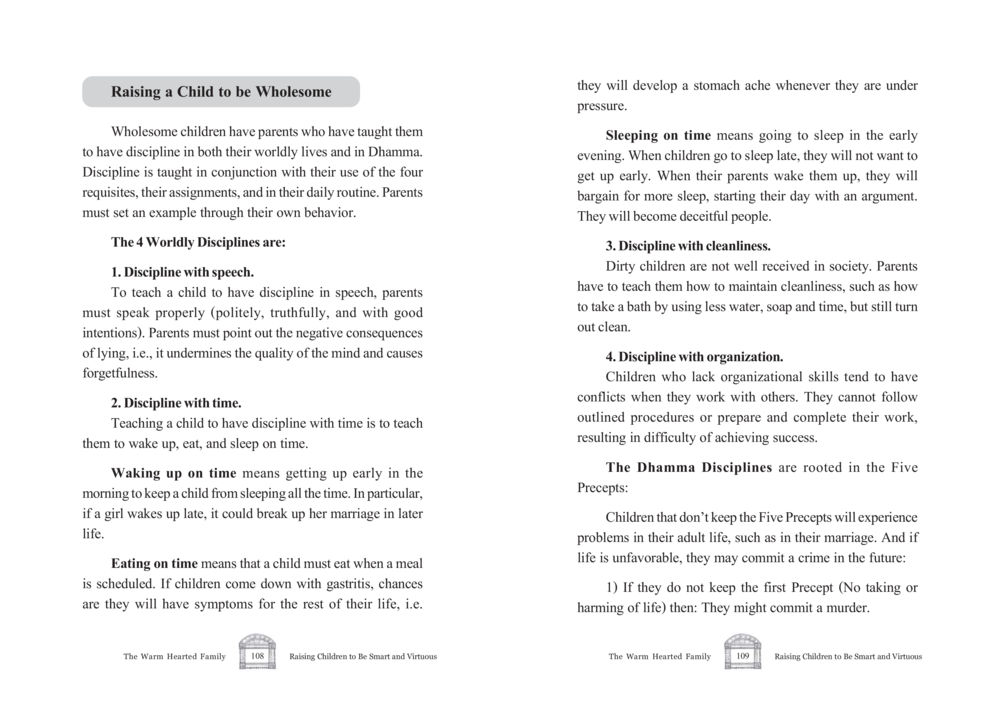Raising a Child to be Wholesome : หน้า 55/207
The Warm Hearted Family : หน้า 55/207 Learn how to raise disciplined children through proper speech, time management, cleanliness, and organization, rooted in Dhamma principles.
0 ครั้ง

สรุปเนื้อหา
การเลี้ยงดูเด็กให้มีความดีงามนั้นเริ่มจากการสร้างวินัยทั้งในชีวิตประจำวันและในด้านธรรมะ โดยการตั้งตัวอย่างที่ดีจากพ่อแม่ ผู้ปกครองควรสอนเด็กให้มีวินัยในการพูด การใช้เวลา ความสะอาด และการจัดระเบียบ เพื่อให้เด็กเติบโตเป็นคนดีในสังคม อาทิเช่น การสอนวินัยในการพูดที่สุภาพและจริงใจ เพื่อหลีกเลี่ยงผลเสียจากการโกหก, การจัดการเวลาที่ถูกต้อง เช่น การตื่นขึ้นและกินอาหารตามเวลา, การรักษาความสะอาด, และการมีทักษะในการจัดระเบียบในการทำงานที่จะช่วยให้พวกเขาประสบความสำเร็จในอนาคต และความสำคัญของการรักษาศีลห้าในการเติบโตของพวกเขาในฐานะผู้ใหญ่.
หัวข้อประเด็น
-การเลี้ยงดูเด็ก
-วินัยในชีวิต
-ธรรมะในเด็ก
-การใช้เวลาอย่างมีระเบียบ
-การสอนความสะอาด
-ทักษะการจัดระเบียบ
ข้อความต้นฉบับในหน้า
Raising a Child to be Wholesome
Wholesome children have parents who have taught them
to have discipline in both their worldly lives and in Dhamma.
Discipline is taught in conjunction with their use of the four
requisites, their assignments, and in their daily routine. Parents
must set an example through their own behavior.
The 4 Worldly Disciplines are:
1. Discipline with speech.
To teach a child to have discipline in speech, parents
must speak properly (politely, truthfully, and with good
intentions). Parents must point out the negative consequences
of lying, i.e., it undermines the quality of the mind and causes
forgetfulness.
2. Discipline with time.
Teaching a child to have discipline with time is to teach
them to wake up, eat, and sleep on time.
Waking up on time means getting up early in the
morning to keep a child from sleeping all the time. In particular,
if a girl wakes up late, it could break up her marriage in later
life.
Eating on time means that a child must eat when a meal
is scheduled. If children come down with gastritis, chances
are they will have symptoms for the rest of their life, i.e.
they will develop a stomach ache whenever they are under
pressure.
Sleeping on time means going to sleep in the early
evening. When children go to sleep late, they will not want to
get up early. When their parents wake them up, they will
bargain for more sleep, starting their day with an argument.
They will become deceitful people.
3. Discipline with cleanliness.
Dirty children are not well received in society. Parents
have to teach them how to maintain cleanliness, such as how
to take a bath by using less water, soap and time, but still turn
out clean.
4. Discipline with organization.
Children who lack organizational skills tend to have
conflicts when they work with others. They cannot follow
outlined procedures or prepare and complete their work,
resulting in difficulty of achieving success.
The Dhamma Disciplines are rooted in the Five
Precepts:
Children that don't keep the Five Precepts will experience
problems in their adult life, such as in their marriage. And if
life is unfavorable, they may commit a crime in the future:
1) If they do not keep the first Precept (No taking or
harming of life) then: They might commit a murder.
The Warm Hearted Family
108
Raising Children to Be Smart and Virtuous
The Warm Hearted Family 109
Raising Children to Be Smart and Virtuous
หน้าหนังสือทั้งหมด

1

2

3

4

5

6

7

8

9

10

11

12

13

14

15

16

17

18

19

20

21

22

23

24

25

26

27

28

29

30

31

32

33

34

35

36

37

38

39

40

41

42

43

44

45

46

47

48

49

50

51

52

53

54

55

56

57

58

59

60

61

62

63

64

65

66

67

68

69

70

71

72

73

74

75

76

77

78

79

80

81

82

83

84

85

86

87

88

89

90

91

92

93

94

95

96

97

98

99

100

101

102

103

104

105

106

107

108

109

110

111

112

113

114

115

116

117

118

119

120

121

122

123

124

125

126

127

128

129

130

131

132

133

134

135

136

137

138

139

140

141

142

143

144

145

146

147

148

149

150

151

152

153

154

155

156

157

158

159

160

161

162

163

164

165

166

167

168

169

170

171

172

173

174

175

176

177

178

179

180

181

182

183

184

185

186

187

188

189

190

191

192

193

194

195

196

197

198

199

200

201

202

203

204

205

206

207
หนังสือที่เกี่ยวข้อง
Load More
